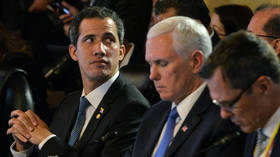Dass George Soros von James Kirchick im „Cicero” frontal angegriffen wird, ist insofern interessant, als Kirchick, selbst Jude wie Soros, ihm vorwirft, er würde Kritiker mit der Antisemitismus-Keule niederstrecken, er also genau das Argument benutzt, was auch Soros-Kritiker immer wieder anführen, was aber in deren Fall immer als Verschwörungstheorie oder typisch antisemitisches Stereotyp gebrandmarkt wird. Kirchick schreibt, „lange bevor ein Immobilienmogul namens Trump davon schwadronierte, Hillary Clinton ‚wegsperren‘ zu wollen, hatte Soros die Sprache der politischen Verächtlichmachung und Herabwürdigung eingesetzt”, um dann kurz und bündig zu postulieren, George Soros sei „kaum die richtige Person, um die Werte von rhetorischer und politischer Mäßigung hochzuhalten”.
© AP PHOTO / POOL/OLIVIER HOSLET
Kirchick nimmt in seinem
Gastbeitrag für den „Cicero” immer wieder Anleihen bei einem Artikel im US-Magazin
„The New Yorker” vom 23. Januar 1995. Die Reporterin Connie Bruck schrieb in ihrem international noch heute als eine Art Standard-Porträt über Soros geachteten Artikel „The World According to George Soros" (Deutsch sinngemäß „George Soros und wie er die Welt sieht") ein Psychogramm über diesen Mann, das offenbar nichts an Aussagekraft eingebüßt hat, wie Kirchick etwas erstaunt feststellt.
Kirchick bestätigt indirekt auf Soros bezogene „Verschwörungstheorien"
© REUTERS / YVES HERMAN/FILE PHOTO
Was James Kirchick mit seinem Cicero-Artikel „Die zwei Gesichter des Georges Soros" wahrscheinlich so nicht beabsichtigt hat, er bestätigt immer wieder wie nebenbei, dass George Soros tatsächlich in praktisch alle politischen Umstürze in ehemaligen sowjetischen Republiken oder Satellitenstaaten der zurückliegenden Jahre involviert gewesen ist. Also genau das, was Soros immer wieder vorgehalten, aber als Verschwörungstheorie abgetan wird.
Gleich zu Beginn des Artikels berichtet Kirchick von seinen ersten Erinnerungen an George Soros am Beginn seiner journalistischen Karriere, die beim staatlichen US-Auslandsradio „Radio Free Europe/Radio Liberty (RFE/RL)” ihren Anfang nahm. Es sei an dieser Stelle zunächst festgehalten, dass RFE/RL während der Zeit des Kalten Krieges in der Öffentlichkeit den Eindruck zu erwecken suchte, ein privates Rundfunkangebot zu sein, das den Gedanken von Demokratie und Freiheit in den Machtbereich der damaligen Sowjetunion transportieren wollte. Tatsächlich aber wurde RFE/RL bis in die 70er Jahre hinein — fast ist man erstaunt —
von der Central Intelligence Agency (CIA), also einem der Auslandsgeheimdienste der USA finanziert. Jahrelang wurde das als „kommunistische Verschwörungstheorie" denunziert.
Heute kann man also konstatieren, die Regierungen der Sowjetunion oder der DDR hatten damals Recht, als sie öffentlich feststellten, „Radio Free Europe" und „Radio Liberty" seien geheimdienstlich gesteuerte Propagandainstrumente, um im Sinne der USA zu desinformieren, zu destabilisieren, zu infiltrieren und zu manipulieren. Noch heute sind die Staaten der ehemaligen Sowjetunion und die sie umgebenden Länder „Zielgebiet" von RFE/RL. Natürlich geht es auch heute offiziell nur um das Hochhalten des Feuers der Freiheit, wie das Logo des in 28 Sprachen ausgestrahlten Radioangebots bis heute suggeriert. Und natürlich sind diese staatlich finanzierten Programme keine Propaganda, wird behauptet. Aber zurück zu James Kirchicks ersten journalistischen Schritten bei diesem Qualitätsmedium. Kirchick erinnert sich also:
„Nachdem ich meine Pflichtrundreise durch Europa beendet hatte, war mir völlig klar geworden: Ganz gleich, ob ich mit einem Demokratieaktivisten in Baku, einer Kämpferin für die Rechte von Lesben in Bischkek oder einem Anwalt für Pressefreiheit in Belgrad sprach, immer standen die Chancen sehr gut, dass sie von einem Soros-Stipendium profitiert hatten, von Soros finanziert oder bei ihm angestellt gewesen waren”.
Was George Soros unter „offene Gesellschaft" versteht
© AP PHOTO / FERDINAND OSTROP
Jeder Journalist, der sich mit den diversen Aktivitäten von George Soros beschäftigt, wird bei der Recherche schnell feststellen, dass ein nicht unwesentlicher Teil der Vorwürfe gegen Soros genau diese Finanzierung von Organisationen und Bewegungen betrifft, die er und seine Unterstützer und Sympathisanten als Engagement für eine „offene Gesellschaft" deklarieren. Man wird auch feststellen, dass der Terminus „offene Gesellschaft" zwar immer beschrieben wird als Entlehnung aus dem Gedankenschatz des Philosophen Karl Popper, dass im Kern aber eigentlich eine kapitalistische Gesellschaft nach westlichen Vorstellungen der Ära nach dem Ende des Zweiten Weltkriegs gemeint ist.
Popper hat sein Ideal von einer offenen Gesellschaft nie explizit an den Kapitalismus gebunden, sondern war ganz im Gegenteil zeitlebens einer der entschiedensten Gegner eines radikalen Marktliberalismus. Popper wurde vorgeworfen, dass er komplett naiv gewesen sei, was die Durchsetzungsfähigkeit der Interessen von Konzernen und Menschen mit großen Vermögen angehe, konkrete politische Entscheidungen zu generieren und/oder zu beeinflussen. In der Definition von Soros ist eine offene Gesellschaft im Kern aber eine Gleichsetzung von Kapitalismus mit Begriffen wie Demokratie und Freiheit.
James Kirchick beziffert die Summe, die George Soros mittlerweile in die osteuropäischen und postsowjetischen Staaten „investiert" hat, auf 30 Milliarden US-Dollar. Den Grund dafür findet Kirchick im schon erwähnten „New Yorker"-Artikel von Connie Bruck. Schon damals stellte Bruck einigermaßen stirnrunzelnd fest, und Kirchick hebt es als eine der Schlüsselaussagen über Soros auch in seinem Artikel heraus, dass Soros auf der „Jagd nach öffentlicher Aufmerksamkeit" sei. „Er spekulierte darauf, dass er in der Lage sei, seinen Status als Berühmtheit von einem Feld (Finanzen) auf ein anderes (öffentliche Politik) zu übertragen; dieser Wunsch nach Bekanntheit lag in seiner Persönlichkeit begründet" vermutete Bruck 1995. Sie hatte den Eindruck, der sich bei ihr im Laufe der Recherche zu ihrem Artikel verfestigte, in der vielsagenden Untertitelzeile: „Ist der Spekulant und Philanthrop eine außenpolitische Ein-Mann-Maschine oder ein nicht regulierter Milliardär mit einem Messias-Komplex?" zusammengefasst.
„Falsche" neue Prämissen von Soros machen ihn nun auch zu Feind für US-Republikaner
James Kirchick beginnt seinen eigentlichen Angriff auf Soros in seinem Cicero-Artikel mit der Bemerkung:„Doch so wie Soros kein finsteres Superhirn ist, das die westliche Zivilisation zerstören will, so ist er auch nicht das edel gesinnte, tadellose Opfer, als das ihn linke Hagiografen beschreiben." Als Hagiografien werden die Biografien von Heiligen bezeichnet. Wann Soros zu einem Heiligen erhoben wurde, muss Kirchick noch nachreichen, aber wir lernen bei ihm schnell, dass es zwei Dinge sind, die ihn am George Soros unserer Tage stören.
Erstens. Kirchick findet es ganz schlecht, dass Soros sein Geld nicht mehr hauptsächlich zur Destabilisierung osteuropäischer Staaten einsetzt, sondern neuerdings vor allem in den USA, weil er mit der Amtsübernahme des Republikaners George W. Bush als Präsident der Vereinigten Staaten die offene Gesellschaft, wie er sie sich wünscht, nun auch in den USA gefährdet sah und sieht. Kirchick konstatiert verächtlich und erbost:
© AFP 2018 / FABRICE COFFRINI
„Je größer diese Obsession wurde, umso wichtiger wurde für Soros der politische Wandel in Amerika, was zulasten seiner Unterstützung der demokratischen Transition in postautoritären Staaten und der Eindämmung der militärischen und geopolitischen Ambitionen von gefräßigen Diktaturen wie Russland und China ging. ‚Das größte Hindernis für eine stabile und gerechte Weltordnung sind die Vereinigten Staaten‘, schrieb der frühere Anhänger der amerikanischen Supermacht und Verfechter der Ideale einer offenen Gesellschaft 2007. Was den islamischen Extremismus anging, so erkannte Soros ein moralisches Gleichgewicht zwischen den Taten von Gruppen wie Al Qaida und denen demokratischer Gesellschaften, die sich gegen ihre Verwüstung verteidigten: ‚Wir verabscheuen Terroristen, da sie beim Kampf für ihre Ziele unschuldige Menschen töten‘, erklärte er 2006 Newsweek. ‚Aber im Zuge des War on Terror tun wir genau dasselbe‘”.
Das alte Problem: Doppelstandards
Das ist also das eine Problem, das James Kirchick mit George Soros hat. Er verübelt ihm, dass er mit seinem Geld und den damit finanzierten Methoden nun in den USA statt in Osteuropa agiert. Viel interessanter ist jedoch, dass Kirchick auch in diesem Zusammenhang so ganz nebenbei offenbart, dass nicht nur viele Vorwürfe gegen Soros und seine Stiftungen, sondern auch Vorwürfe an westliche Staaten eben doch keine Verschwörungstheorien gewesen sind, sie hätten die Farben- und Blumenrevolutionen angezettelt. Etwa, wenn Kirchick schreibt:
„In den neunziger und 2000er Jahren führte die Vor-Ort-Arbeit von Open Society im ehemaligen Einflussgebiet der Sowjetunion Soros und sein Netzwerk ganz selbstverständlich dazu, Bündnisse mit den ‚Falken‘ der amerikanischen Republikaner zu schmieden, um sich gemeinsam gegen die Bedrohungen zu wappnen, die Putin für die jungen Demokratien Europas darstellte”.
Um dann über Randy Scheunemann, ehemaliger Mitarbeiter von Senator John McCain, unschuldigen Augenaufschlags zu schreiben:
„Scheunemann arbeitete als Berater für den früheren georgischen Staatspräsidenten Michail Saakaschwili, dessen Aufstieg an die Macht während der Rosenrevolution 2003 eng mit einigen von Soros finanzierten Gruppen zu tun hatte”.
Auch für Republikaner gilt: Geld stinkt nicht
Dass John McCain auch einer der aggressivsten Vertreter der US-amerikanischen Politik im Zusammenhang mit der so genannten Orangenen Revolution in der Ukraine gewesen ist, erfahren wir natürlich nicht von Kirchick, das müssen wir uns selbst in Erinnerung rufen. Dafür erfahren wir aber von James Kirchick eine andere interessante Information über McCains rechte Hand, Randy Scheunemann, die er ebenfalls fast wie nebensächlich in seinen Text einstreut. Nämlich dass Scheunemann nach der erfolglosen Präsidentschaftskandidatur von McCain 2008 beim „Open Society Policy Center" von Soros' „Open Society Foundation" anheuerte, um sich gegen die Militärdiktatur in Myanmar einzusetzen. Kirchick zitiert Scheunemann mit den Worten:
„Scheunemann sagte mir: ‚Die Linie, die ich vertrat, war, dass ich sein [Soros'] Geld jederzeit nahm, um die Militärdiktatur in Myanmar zu destabilisieren. Das hieß jedoch nicht, dass ich damit auch seine innenpolitischen Ziele übernahm‘”.
Das war damals als Beruhigung für entsetzte republikanische Parteifreunde gedacht, die am Verstand von Scheunemann zweifelten, weil er ausgerechnet mit Soros zusammenarbeitete, der vor allem die Demokraten reichlich mit Spenden bedachte. Doch nach Überzeugung von Kirchick war wohl auch Scheunmann naiv in seiner Einschätzung von Soros. Kirchick schreibt:
„‘Dass Soros Milliarden von Dollar dafür ausgibt, republikanische Kandidaten im US-Senat zu verhindern, macht es gleichzeitig für uns bedeutend komplizierter, wenn wir bei unseren Freunden für das zivile Engagement werben wollen, welches das Soros-Netzwerk in Washington, D.C. fördert‘, erklärte mir ein amerikanischer Politikfunktionär, der jahrzehntelang in Mittel- und Osteuropa mit Soros-Stipendiaten gearbeitet hat”.
Destabilisieren und Spalten mit Soros-Geld bitte nur, wenn es nicht die USA betrifft
Kirchick bestätigt sodann, dass auch die Online-Petitions- und Kampagnen-Plattformen „Move On" und „Media Matters" oder das „Center for Constitutional Rights" mit Geld von George Soros entstanden sind und zusammen mit anderen „linken" Aktivitäten nach Meinung von James Kirchick zu „Polarisierung, Aufspaltung der Gesellschaft, Parteilichkeit und einem allgemeinen Niedergang des öffentlichen Diskurses" in den USA geführt haben. Fast erübrigt es sich, das festzuhalten, aber selbstverständlich ist der zwingend logische Umkehrschluss, dass von Soros finanzierte Institutionen eventuell auch in osteuropäischen oder anderen Staaten zu „Polarisierung, Aufspaltung der Gesellschaft, Parteilichkeit" und einem allgemeinen „Niedergang des öffentlichen Diskurses" geführt haben könnten, für James Kirchick keinerlei Überlegung wert.
Soros angeblicher zweiter großer Fehler: Er setzt sich nicht genug für Israel sein
James Kirchicks formulierte den Beginn seiner Abhandlung über den zweiten verwerflichen Fehler von George Soros mit der Überschrift: „Viel Einsatz für Muslime und Transgender, wenig für Juden." Für diesen Vorwurf wählt Kirchick einen merkwürdig kurvenreichen Weg, um am Ende gegen Soros austeilen zu können. Einerseits beschreibt er ihn als Opfer antisemitischer Beschimpfungen von Rechts und Links. Er lobt — und das völlig zu Recht — den Einsatz von George Soros für die Volksgruppe der
Roma, die vor allem in Südosteuropa bis heute unter zum Teil erbärmlichen und diskriminierenden Verhältnissen leben. Er schildert ehrfürchtig die jahrelangen Milliardenausgaben von Soros zur Umwandlung osteuropäischer Staaten nach den Vorstellungen des Westens.
Aber mit dem Vorwurf an Soros, er würde jeden Kritiker als Antisemiten und Nazi beschimpfen und sein Geld für Organisationen und Bewegungen in den USA ausgeben, die der Idee einer offenen Gesellschaft einen Bärendienst erweisen, weil sie vor allem Republikaner und ihnen wohlgesonnene Medien aufs Korn nehmen, baut Kirchick das Fundament für die Feststellung auf:
„Während Soros sich ungemein großzügig zeigt bei der Finanzierung einer Fülle von Organisationen und Einzelpersonen, die sich für praktisch jede vorstellbare identitätsstiftende Gruppe einsetzen, scheint er am Wohlergehen einer Gruppe ziemlich desinteressiert: seiner eigenen”.
Kirchick wirft anderen antisemitische Klischees vor, die er selbst benutzt.
Vor dem Hintergrund der in seinem Artikel vorangegangenen ausführlichen Beschreibungen Kirchicks über antisemitische Beschimpfungen gegen Soros und antisemitische Stereotype, verwundert es schon ein wenig, wenn auf einmal Kirchick selbst bedenkliche antisemitische Argumentationsmuster anwendet. Denn es darf als sicher gelten, dass jeder Nichtjude, der George Soros nicht vordergründig als Mensch, sondern als Jude definiert, umgehend mit dem Fallbeil des Antisemitismus von Kirchick bedacht werden würde. Erst recht, wenn auch noch Worte wie „Weltregierung" oder „Mainstreammedien" benutzt würden, so wie Kirchick dies in seinem Artikel tut.
George Soros hat in einigen Äußerungen einigermaßen deutlich gemacht, dass er mit den Organisationsformen seiner jüdischen Glaubensschwestern und —brüder nichts anzufangen weiß. Dazu zählt auch der Staat
Israel. Kirchick zitiert dazu einmal mehr angewidert aus dem Artikel von Connie Bruck aus dem Jahr 1995, weil Soros ihr damals diktiert hatte:
„Ich spreche den Juden nicht ihr Recht auf einen Nationalstaat ab — ich möchte nur nicht Teil dessen sein”.
Das findet eindeutig nicht die Zustimmung von James Kirchick, der noch einmal bemängelt, wohin George Soros sein Geld noch schicken könnte, es aber nicht tut, weshalb Kirchick ihm einen Satz entgegenschleudert, für den jeder andere, zum Beispiel ein Redakteur unseres Mediums, mit ziemlicher Sicherheit virtuell von James Kirchick gesteinigt worden wäre:
„Stattdessen hat sich Soros dafür entschieden, zukünftige Generationen mit intersektionalem linksgerichteten Aktivismus zu versorgen”.
Fast am Schluss des Artikels fällt noch so ein Satz, der sich an Politiker und Journalisten richtet, die mit George Soros zusammenarbeiten oder über ihn berichten und der erst beim zweiten Lesen offenbart, mit welcher göttlichen Segnung der selektiven Selbstwahrnehmung und moralischer Doppelstandards James Kirchick beschenkt worden ist:
„Denn sie berichten über Soros, als müssten jene Menschen, die seine Arbeit kritisch sehen, Faschisten, Antisemiten und geistig verwirrte Verschwörungstheoretiker sein”.
Man möge sich diesen Satz noch einmal in Erinnerung rufen, wenn das nächste Mal George Soros kritisiert oder ihm vorgeworfen wird, er habe mit seinen Milliarden zu Destabilisierung und Umstürzen in vielen Staaten Osteuropas beigetragen, um eine westliche Agenda von Regime-Change durchzusetzen, ob Kirchick diese Kritiker dann auch so verteidigt.
https://de.sputniknews.com/meinungen/20190224324085742-usa-george-soros/









